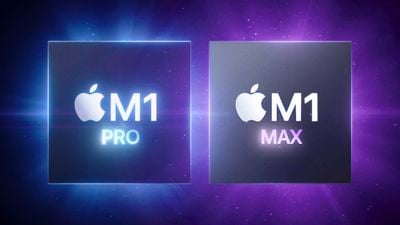AnandTech's Deep Dive Into M1 Pro and M1 Max Highlights Performance and Efficiency Improvements
We've heard Apple's overview of the the M1 Pro and M1 Max Apple silicon chips and we've seen benchmarks of the CPU and GPUs, but AnandTech has done a technical deep dive into the capabilities of the new chips that's well worth reading for those who are interested in learning more.

According to AnandTech, the M1 Pro is a new implementation of the M1 chip, but designed "from the ground up" to offer more performance. AnandTech says that this is the more interesting of the two chip designs because it offers "mostly everything that power users will deem generationally important in terms of upgrades."
The CPU cores clock up to 3228MHz peak, however vary in frequency depending on how many cores are active within a cluster, clocking down to 3132 at 2, and 3036 MHz at 3 and 4 cores active. I say "per cluster", because the 8 performance cores in the M1 Pro and M1 Max are indeed consisting of two 4-core clusters, both with their own 12MB L2 caches, and each being able to clock their CPUs independently from each other, so it's actually possible to have four active cores in one cluster at 3036MHz and one active core in the other cluster running at 3.23GHz.
The higher-end M1 Max is identical to the M1 Pro, with the exception of the GPU and the media encoders.
The GPU and memory interfaces of the chip are by far the most differentiated aspects of the chip, instead of a 16-core GPU, Apple doubles things up to a 32-core unit. On the M1 Max which we tested for today, the GPU is running at up to 1296MHz - quite fast for what we consider mobile IP, but still significantly slower than what we've seen from the conventional PC and console space where GPUs now can run up to around 2.5GHz.
AnandTech's M1 Pro and M1 Max overview goes into much more depth about the unified memory, the power behavior, and CPU and GPU performance. All in all, AnandTech says that these new chips "truly feel like SoCs that have been made with power users in mind," and performance metrics have been boosted "in all vectors."
The chips here aren't only able to outclass any competitor laptop design, but also competes against the best desktop systems out there, you'd have to bring out server-class hardware to get ahead of the M1 Max – it's just generally absurd.
The site was expecting significant boosts in performance, but "didn't expect some of the monstrous increases that the new chips are able to achieve." The chips outclass any competing laptop design, and also rival the best desktop systems available.
Popular Stories
The long wait for an Apple Watch Ultra 3 appears to be nearly over, and it is rumored to feature both satellite connectivity and 5G support.
Apple Watch Ultra's existing Night Mode
In his latest Power On newsletter, Bloomberg's Mark Gurman said that the Apple Watch Ultra 3 is on track to launch this year with "significant" new features, including satellite connectivity, which would let you...
Apple's next-generation iPhone 17 Pro and iPhone 17 Pro Max are just over two months away, and there are plenty of rumors about the devices.
Below, we recap key changes rumored for the iPhone 17 Pro models.
Latest Rumors
These rumors surfaced in June and July:Apple logo repositioned: Apple's logo may have a lower position on the back of the iPhone 17 Pro models, compared to previous...
The iPhone 17 Pro Max will feature the biggest ever battery in an iPhone, according to the Weibo leaker known as "Instant Digital."
In a new post, the leaker listed the battery capacities of the iPhone 11 Pro Max through to the iPhone 16 Pro Max, and added that the iPhone 17 Pro Max will feature a battery capacity of 5,000mAh:
iPhone 11 Pro Max: 3,969mAh
iPhone 12 Pro Max: 3,687mAh...
The upcoming iPhone 17 Pro and iPhone 17 Pro Max are rumored to have a slightly different MagSafe magnet layout compared to existing iPhone models, and a leaked photo has offered a closer look at the supposed new design.
The leaker Majin Bu today shared a photo of alleged MagSafe magnet arrays for third-party iPhone 17 Pro cases. On existing iPhone models with MagSafe, the magnets form a...
Apple's position as the dominant force in the global true wireless stereo (TWS) earbud market is expected to continue through 2025, according to Counterpoint Research.
The forecast outlines a 3% year-over-year increase in global TWS unit shipments for 2025, signaling a transition from rapid growth to a more mature phase for the category. While Apple is set to remain the leading brand by...
iOS 26 and iPadOS 26 add a smaller yet useful Wi-Fi feature to iPhones and iPads.
As spotted by Creative Strategies analyst Max Weinbach, sign-in details for captive Wi-Fi networks are now synced across iPhones and iPads running iOS 26 and iPadOS 26. For example, while Weinbach was staying at a Hilton hotel, his iPhone prompted him to fill in Wi-Fi details from his iPad that was already...
Apple today seeded the second betas of upcoming iOS 18.6 and iPadOS 18.6 updates to public beta testers, with the betas coming just a day after Apple provided the betas to developers. Apple has also released a second beta of macOS Sequoia 15.6.
Testers who have signed up for beta updates through Apple's beta site can download iOS 18.6 and iPadOS 18.6 from the Settings app on a compatible...




















